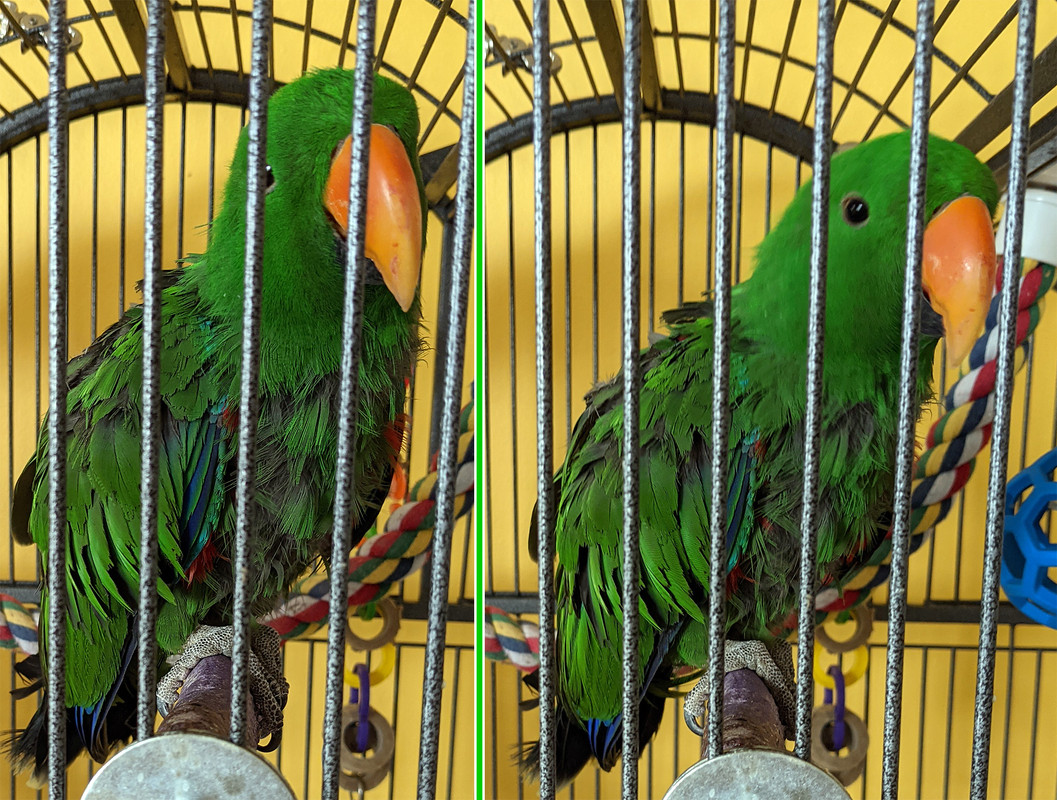I'd suggest cuddling less (because he looks older than a super young baby), as cuddling is a sexual behavior in adult birds and you don't want to start what you can't sustain in adulthood (stick to petting on the head and neck- ekkies are hormonal year-round if triggered). She can still pet him, but shouldn't really "cuddle" -- interaction should be structured more around shared activities and training rather than snuggles (not saying not to touch the bird, but that shouldn't be the main form of interaction and should be restricted to head and neck). An hour a day of cuddles is going to set a really unhealthy precedent moving into adulthood, but 3 hours out of cage and lots of interaction are important.
Wow... you know, instinctually I was thinking to myself that my roommate is far too physically affectionate with the baby. She holds him to her chest and kisses his beak, his head, strokes his back, belly, etc., and will hug him nestled into her neck, while cooing to him "I love you, I love you so much" repeatedly. Birds are not like cats & dogs... didn't seem right to me that she'd cuddle with him like that. Sounds like this isn't a good thing. I don't know how to... "break it" to her though.
There are times when a whole day goes by and the only cage-out time the birds get is like a few minutes on the living room couch. 3 hours... nowhere near that much.
How much sleep does he get nightly? 10 hours is the bare-bones minimum for them and it should be on a routine. If the bird is in a main area at night when you are still up, it may not be sleeping as much as you think (they can be quiet and awake under their cage cover). It's best if they have a bedtime and wake-up routine that stays within a few hour window (ensuring at least 10-12 hours of quiet sleep each night).
This is another problem then. 10 hours? Not really. After eating dinner between 8 and 9pm, we'll watch TV for a few hours. The lights are on and the TV is on up until midnight most nights. They can't see the TV screen from their cages but they can hear it. Actually, the male Eclectus will make short muted "groaning" noises when it's late & lights are on. And he stops as soon as lights are out. My roommate or I may enter the kitchen between 8am~9am. So if it's 8am, the birds will be awakened... if not already by the sunlight. Sounds like not enough sleep time.
Not much. On weekends, maybe a couple hours. But weekdays, they're lucky if it's an hour, some days only about 20~30 minutes.
He does play with toys. There's a "toy tray" near the couch that will be taken out for him. There are little plastic cups, screw/nut thingies, and other assorted toys he'll dabble with. He does have some toys in his cage as well and sometimes I'll see him playing with them.
The feed isn't actually pellets. They're an assortment of mostly various seeds & nuts. So I should have said "blended" rather than formulated. Oops!
She does have an avian certified vet, but I don't think she has had blood work done on him.
Are you using any standard cleaning products, candles, air fresheners, oil warmers, diffusers, or scented products in the home? Perfumes, lotions, standard cleaners (along with the other things I mentioned( are harmful to them and can cause respiratory and skin irritation in some cases.
Great questions. My roommate (the owner) is highly attuned to this. All cleaning products are scrutinized for being bird-safe. We don't wear fragrances around the birds or use any diffusers with unnatural products either.
You might also check humidity-- you want to keep it pretty high (but not so high that things mold)...shoot for the 60s if possible.
Hadn't thought of that. It's not humid in the apt, but given the drier air of winter it's probably a good idea for us to start running a humidifier in the bird cage area. I'll bring that up.
Thanks so much!




